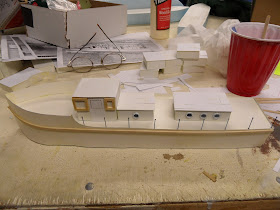one of the originals
When one of our readers contacted me and asked if I would build him several for a game he was planning I only had to stop and consider it for a few seconds. It turns out that he wants eight craft. This gave me the opportunity to try my hand at a production run rather than the one-off models that I have been building so far. There was an exchange of emails and I was off to the workshop.
first I made a deck-plan template, then I copied that plan onto heavy card twelve times,
this would serve as both the deck and a template or cutting the hull
then I knocked up a jig for cutting the cabin and deck-houses
the hulls were smooth planking so I wouldn't be adding rivets later (HOORAY!)
to speed things along I made another template for the hull sides,
I cut two dozen of these and got to work gluing them onto the blue-board hull blanks
painter's tape holds the hull planking together while the glue dries
checking to make sure that I have the look right,
there was some size compression and I had to make sure the proportions still looked good
having decided that things were OK, I then banged out the rest of the hulls,
one of the advantages of working production-line style
is that there is always something else to work on while the glue is drying
the companion-way hatches were added from card
the port-holes were from Reverisco,
a real life-saver as I still can't figure how to scratch-build them
I am not at all happy with the window-framing of the cabin
I will have to come up with something that doesn't look so heavy and clunky
I added some crew figures to take a look at it again for proportion and scale
the 3lbr machine-cannon is a scratch-build of mine,
added to give an idea of the space
still a sleek-looking vessel even with the size compression
the 4" deck gun on the fantail is a bit much
I started on the railings but ran out of pins
(of course this happens at 2200hrs so I can't get more until tomorrow)
3/4 front
3/4 rear
I am really enjoying this project. It is too bad that the period paint-scheme is an overall medium blue-gray as I think that they would look really cool with the white and orange scheme used after the war.
















I see your shipbuilding yard is up and running...good. The 'compression' is perfect, IMO. Suggestion: slice off a piece of some styrene tubing + add your 'rivets' and you've got portholes.
ReplyDeleteReally good looking and in quantity too. Like Jay says, the compression is just right.
ReplyDeleteComing together very nicely. This may be unwanted, and too late as well, but I think if you lower the 'wall' (my nautical terminology is lacking at best) around the prow to half to two thirds of its current height it would better reflect the original, at least the one pictured.
ReplyDeleteAlso, could you (or have you already) cover some of the tools you used to make these awesome ships. You are inspiring me to start another project...
Point well made David, the gunwale (the "wall") ended up high for two reasons; length compression (about 20%) makes it look taller - it also makes the entire vessel look taller - and I built one with the lower height gunwale and it looked a little silly, as if the crew could trip on it and fall overboard. Additionally some of the vessels had higher gunwales (they were made by a dozen or more builders) particularly the ones built in the North-East by companies that had seen a "Nor'easter" or two. Being wooden vessels that were easily adapted to a variety of uses over the years they were often modified, I have photos that show the companionways arranged at least three different ways as well and others with radically different deck-houses.
ReplyDeleteRegarding the tools used, that is a good idea, they are covered in an offhand manner in the entries on the "Adventures in Blue Board and Foamcore" page at the top of the blog, but I have never particularly addressed the actual way I make stuff. I will have to get on that.
Really nice post, and great blog too!
ReplyDeletehi lovely work l use steel washers for portholes kind regards Paul
ReplyDeleteI must confess to just being lazy and using the Reverisco portholes; they are cheap and nicely detailed. They are one of the few things that I don't make by hand.
Delete